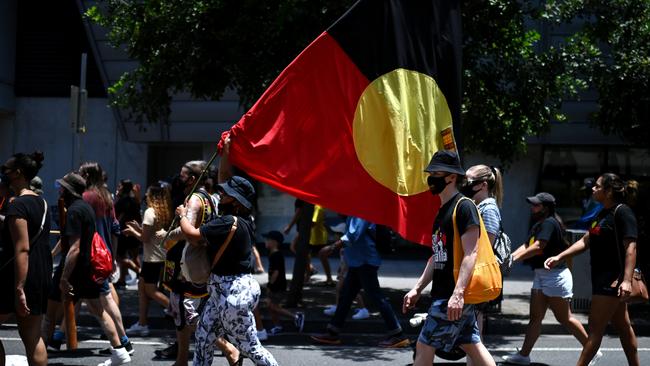Andrew Bolt: It’s time to choose your identity
Legally, you are Aboriginal if you have an Aboriginal ancestor and are accepted as such by other Aborigines. But is that definition changing?
Andrew Bolt
Don't miss out on the headlines from Andrew Bolt. Followed categories will be added to My News.
Last year one of our universities boasted it had hired an Aboriginal professor, “a proud Winninninni woman”.
This was a big achievement for a woman who says she’s from “an Aboriginal mob from West Queensland”, and survived the worst that white Australia could throw at an Aboriginal family.
She has written that her father was taken away as a child, and, later, to save his “mocha blonde” daughter from being stolen, sent her from Queensland to NSW when she was about eight.
Even so, she suffered terrible racism: “I used to come home the ‘back way’ to avoid being pelted with rocks and stones from the other kids, and being called ‘nigger’…”
But the announcement of her promotion to professor has revived a debate so delicate and dangerous that it’s safer not to identify her.
The question: what exactly is an Aborigine?
There is no doubt this professor feels in her bones she is Aboriginal.
That’s her right, and there’s no absolute proof she’s not Aboriginal.
Several universities, and the ABC, have accepted her as Aboriginal and she’s given her new university a certificate of Aboriginality.
But last September, the First Nations Telegraph, run by Aboriginal activist Stephen Hagan, reported on the promotion of this “Winninninni woman”, and some readers were puzzled.
They told Hagan they’d never heard of this tribe. I’ve checked. There is no reference anywhere to the Winninninni, not even in Norman Tindale’s magisterial Aboriginal Tribes of Australia, published in 1974.
Had the Winninninni perhaps been wiped out? Had it survived only as oral history, imperfectly remembered?

Hagan asked the university for answers. It responded: ‘This is a personal matter and she (the professor) will contact you when she feels it’s the right time.”
Weeks later, I asked the professor: “Can you tell me where precisely the Winninninni lived? Which ancestor is the Aborigine from which you trace your Aboriginality?”
No response. So I asked the university, and on September 25 it replied that the professor was “the daughter of (a) renowned Aboriginal artist” who had “raised her with the knowledge that they are descendants of the Winninninni people of southern Queensland”.
So the Winninninni were now from southern Queensland, not western. But the mystery deepened.
A search of genealogical records revealed this “Aboriginal artist” father was in fact the professor’s adoptive father, marrying her mother in the year the professor turned 16.
What’s more, his ancestors were all of British or Irish descent. (So were her birth father’s.)
But her adoptive father, now dead, did have one publicly known claim to Aboriginality.
The art society he founded says he went to work in the Northern Territory when he was 18 and was initiated into the “Yarrunga Jarra” tribe of Arnhem Land.
Yet there’s no record of that tribe, either. Still, could the stories this man told his adoptive daughter make her Aboriginal?
I’ve repeatedly asked the professor to explain but she refused to comment, although she did CC me on an email to her university: “Ask him if he can supply a map (of Aboriginal tribes) that is 100 years old. And I have engaged a defamation lawyer …”
That’s enough to stop most people asking such questions, and not just because our laws against free speech are so tough.
The definition of “Aboriginal” is also ambiguous.
Legally, you are Aboriginal if you have an Aboriginal ancestor, and are accepted as Aboriginal by other Aborigines.
But is that definition changing? Today, a man can even identify as a woman.
Can we now choose our own race, too? Bruce Pascoe, best-selling “Aboriginal” author of Dark Emu, seems to have done just that.
He, too, has been made an Aboriginal professor, although genealogical records show his ancestors are all of British descent, and two Aboriginal organisations deny his claim to be a member of their tribes.
Pascoe is not alone. A report by the Centre for Aboriginal Economic Policy Research at the Australian National University said “a significant number of people” — up to 42,000 — “chose to identify as being a person of Indigenous origin” in the 2016 census despite not identifying as Aboriginal in 2011.
Two Deakin University researchers, Elizabeth Watt and Emma Kowal, conclude such a switch of racial identities is less about fraud than faith and fairness: “White identities have lost appeal relative to Indigenous identities because of wider awareness of colonial injustice, an increased emphasis on autochthony, and the rise of environmentalism and holistic spiritualism.”
Is that where we are? As Aboriginal as we feel?



